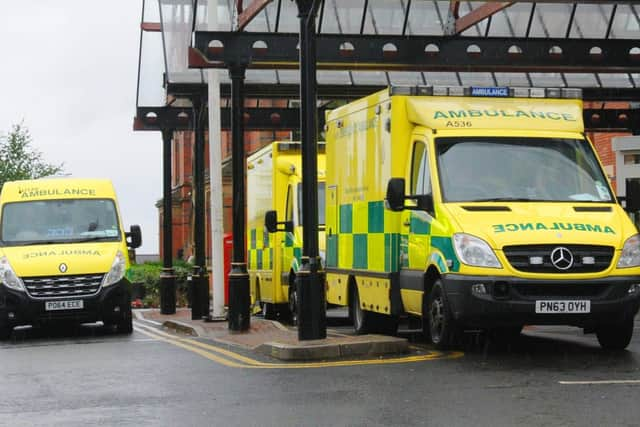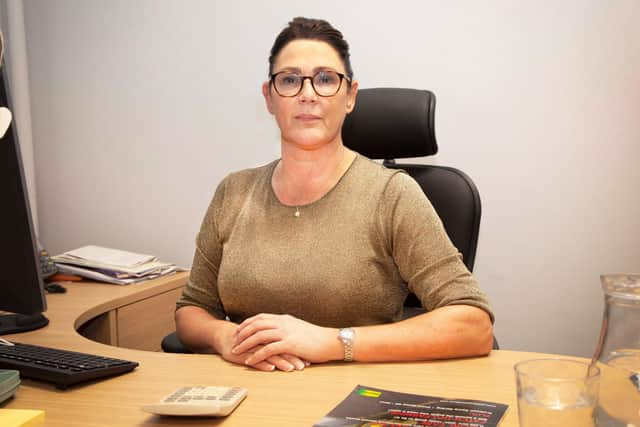Wigan hospital chiefs face "exceptionally high demand" as junior doctors' strike bites
and live on Freeview channel 276
But WWL has fought shy of following several other trusts around the country in calling for medics to come back to work and help out.
The longest strike in NHS history is now into its third day and most hospitals are feeling the strain, especially as it was deliberately timed to coincide with what is historically one of the busiest weeks in the year for them.
Advertisement
Hide AdAdvertisement
Hide AdAnd those covered by Wrightington Wigan and Leigh NHS Foundation Trust (WWL) are no different.


Today (Friday January 5) leaders called on the public to think very carefully whether an A&E visit is necessary (in other words, are life or limb in danger?). This was after earlier reporting that doctors were seeing “a lot of minor illnesses that could have been treated elsewhere such as a GP surgery or pharmacy.”
They also urged loved ones to those poised to be discharged to support their recovery fully at home, presumably to minimise the need for readmission.
But for those who are using services, there are inevitably longer waits than usual and appointments being postponed, for which WWL chiefs have apologised.
Advertisement
Hide AdAdvertisement
Hide Ad

Elsewhere in the country two hospitals have declared critical incidents while others reported significant waits in A&E departments – with neighbouring Bolton NHS Foundation Trust saying patients may need to wait “up to 11 hours”.
A number of hospitals have submitted so-called derogation requests, calling on doctors to return to work.
It is understood that just over 20 requests have been made by hospitals, but some may have submitted more than one request.
The British Medical Association (BMA) said that the derogation process was being “undermined” by the health service, with a number of the requests being submitted well in advance of the strike and a number of hospitals not illustrating what steps they have taken to mitigate the need for junior doctors to work.
Advertisement
Hide AdAdvertisement
Hide AdAll but one of the requests have been rejected, and the final one is being considered by the union.
The BMA said such requests should come as a “last resort” and only be used in “unexpected and extreme circumstances unrelated to industrial action”.
WWL has not resorted to such a measure so far but is still facing tough times.
Mary Fleming, WWL’s interim chief executive, said: “We are experiencing exceptionally high demand for our hospital and community services, and our accident and emergency department (A&E) at the Royal Albert Edward Infirmary is extremely busy.
Advertisement
Hide AdAdvertisement
Hide Ad"I want to thank our staff during this very pressured time and to our patients, their families and wider community for their understanding and support whilst we are experiencing this pressure.
"“Our Emergency Department staff are working really hard to ensure that people get treated as quickly as possible and will continuously prioritise those patients with the highest clinical needs first.
"This does unfortunately mean that patients with less urgent conditions are experiencing much longer waits in our Emergency Department and we apologise for this.
“The public can help us by remembering that Emergency Departments should only be used for life-threatening illnesses and injuries and if you help in these situations, you must come forward. For conditions which are less urgent, please use NHS 111 or consider visiting a local pharmacy, walk-in centre or GP practice for support instead.
Advertisement
Hide AdAdvertisement
Hide Ad“We always prepare for a very busy first week in January however this year it is coupled with the strike action currently being undertaken by the Junior Doctors against the Government – this is also having an impact on our services.
"To further help us during this pressured time, we urge families and friends of patients who are ready to be discharged from our hospitals to support their loved ones to recover at home. Our teams make sure this transition is safe, and recovery at home is always the best option."
Prof Sir Stephen Powis, national medical director for the NHS in England, said the strike coincides with “one of the busiest and most challenging weeks of the year” as the NHS grapples with increased pressure from winter viruses and a rise in people coming forward who delayed seeking help over the holidays.
He added: “As the longest strike in the history of the NHS begins during one of the busiest and most challenging weeks of the year – the health service is experiencing the winter pressures of flu and Covid, combined with the huge disruption of industrial action.
Advertisement
Hide AdAdvertisement
Hide Ad“We know hospitals are already experiencing significant demand, with other NHS services also under immense pressure, and although staff are doing the very best for patients with extensive preparations in place, there is no denying the NHS has started the year in a very difficult position.
“This latest round of strike action will not only have an impact on this week but will have an ongoing effect on the weeks and months ahead as we struggle to recover services and cope with heavy demand.
“Our message for patients remains the same, continue to come forward for care using 999 and A&E in life-threatening emergencies and 111 online for everything else.”
Dr Vin Diwakar, medical director for transformation at NHS England, told the PA news agency that officials had spent weeks doing “intensive preparation” for the strike.
Advertisement
Hide AdAdvertisement
Hide Ad“We have been prioritising emergency care as we have done during previous industrial action,” he said.
“So we have emphasised to the public that if they have got a life-threatening illness they should continue to call 999, if they are worried that they are unwell but it is not an emergency then to use 111 online or 111 or to make an appointment with your GP or use your community pharmacy.